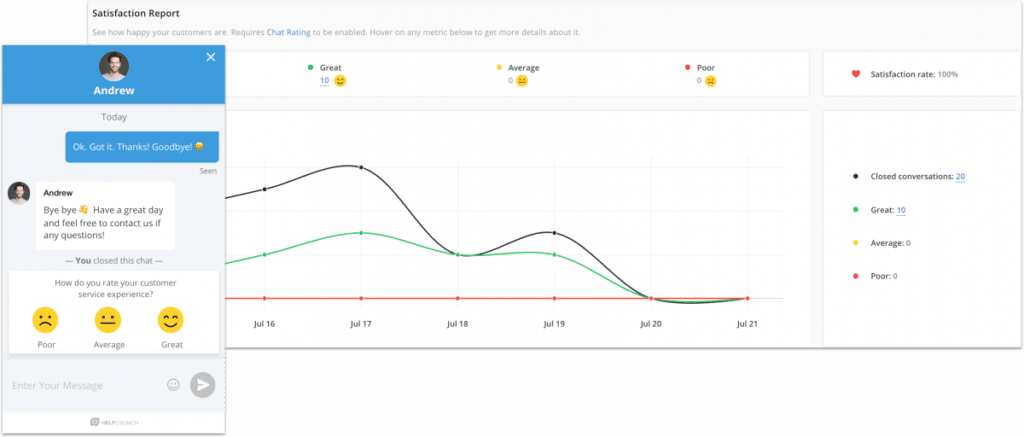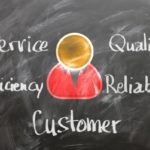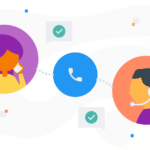10 Ways to Improve Communication with Customers

You have a great product. It is exactly tailored for your target audience. Yet, your customers keep leaving, seemingly with no reason. Though there can be other issues, it is very possible that you are failing in communication. And since communication is a base for each good relationship, clients just won’t stay loyal to businesses that don’t show enough respect.
On the contrary, building up the way you talk to your customers builds stronger connections with existing clients and offers a chance to gain new ones.
In this article, we’ll talk about simple and effective strategies on how to improve communication with customers.
Learn how to communicate succesfully with your clients
What is Customer Communication?
Customer communication is an ongoing dialogue between a company and its customer.
This would be the simplest definition. Yet, there is a bit more to it nowadays. First, the communication in today’s business isn’t only the simple one-to-one, or alternatively “one to small audience” conversation. It’s a flowing, ever-changing dialog between brands and customers that acts like a living story. Written and rewritten daily in many forms.
Through online advertising or social media, brands promote their products to billions of customers and lead at the same time. That makes communication challenging. It creates a need for more creative ways to catch the attention of the masses, and keep them constantly engaged.
Communication, of course, still exists on a micro level, too. Through customer support and sales chats, phone calls, one-on-one email interactions or newsletters to the most loyal clients.
3 Must-Have Customer Communication Types
There are 3 types of communication with customers you should think of in order to succeed. Let’s take a brief look at them.
#1 Ongoing: Only few, if any, businesses ever survived and prospered by simply one-time conversation with a customer that never happened again.
Usually, a sales or loyalty building process takes repeated conversations to gain clients’ trust. Successful companies grow from ongoing relationships with customers.
#2 Dialogue: There are a lot of ways in the business world to initiate communication with customers. Online advertising, social media campaigns, they are all very effective. Great methods to promote your product. But they are often one-way methods.
In overall customer communication, a form of dialogue is crucial. Even if it’s only through a feedback or review. You need to listen at least as much as you speak.
#3 Consistent: More customers a company has, the harder it is to communicate with all of them effectively. Consistency in communication is important.
A collective knowledge leads towards productive conversations that consistently copy the company’s tone of voice, communicate the brand’s message and keep customers interested.
Why is Effective Customer Communication so Important?
Let’s face the truth – nothing is unique. It’s incredibly difficult today to come up with something no one else did before. With billions of brands over the world, with an uncountable competition on the market for each field, it’s easy for customers to leave you and find another service. This means that each client you have is precious.

So, since there are billions of other companies out there from which probably millions offer the same service as you, everything depends on the way you communicate your product. Understanding your audience, knowing who they are and how to talk to them, is what makes all the difference.
What can quality communication bring to you?
- Faster Customer Suppor: Most of the customers agree that speed is the answer to whether they do or don’t have a positive experience with a brand. More your agents and sales representatives learn by effective communication, the faster they will deliver just the right support.
- Reduced Touchpoints: Learning how to improve communication with customers helps you to find out more about their overall problems. Therefore, you will know how to accommodate your service to specific needs.
- More Sales: Providing effective communication with just the right information helps making informed decisions. This way, you sell faster with a higher chance of customers being satisfied with the purchase.
- Loyalty Boost: Effective, personalized communication makes customers feel special. Unique. As someone who you actually know, not only a source of income. Clients who feel like you know them and understand their needs will trust you more.
- Expectations Fulfillment: Customers always had high expectations from customer service, but nowadays it’s higher than ever before. Clients are even willing to pay more if they get exceptionally effective and polite help.
- Negative Experience Elimination: People will talk about your business, no matter what. In the end, you are aiming for that. Yet, the way they talk about your business is what matters. Around 40 % of customers would recommend their close ones not to use your services after a negative customer service experience. For 33 % of clients, only one encounter like this is enough to abandon your business and motivate others to do the same. Some people just leave without saying anything, but some of them will leave a negative review. About 90 % of customers may be influenced by this feedback before making a purchase. This is why improving communication with customers is so crucial.
How to Improve Customer Communication
There are lots of ways to improve communication with customers. We chose 10 most effective ones you should know, so clients always enjoy talking to your agents.
#1 Don’t Be Too Formal
Being too formal makes you sound robotic. Therefore, you are missing out on a very important feature for building loyalty – personalization. According to research, around 84 % of consumers agree that being treated like a person, not like a number, is very important for them to trust the business.
Also, you definitely don’t want to bore your leads or customers. Therefore, the words you use in customer communications should be positive and appealing. Most things work the best when kept friendly, straightforward and simple.
Are you sending out newsletters? Instead of an ordinary “Book two nights and the third one is on us”, try something fresh: “Longing for a good nap? Come and relax at our hotel for two nights. The third one is on us.”
Did you get an email or live chat message from customers who need information on the status of their order? Be professional, but not too reserved: “Hi Susan, we managed to ship your order two days earlier than expected. It’s already on its way,” sounds more natural than “Good afternoon Ms. Jones. Your order has been dispatched. You can expect it in the next few days.”
Also, make sure you send error proof emails and chat messages to your customers. Use online punctuation and grammar checking tools for seamless written communication.

Source: Hiver
#2 Allow Your Customer to Stay in Touch
Rule number one: Be available. Let’s say that your call center’s business hours start at 8 am and finish at 4 pm. But you know that some customers would like to call outside of this time. Make sure they can and give them this opportunity for example by sharing a digital business card with relevant contact details. Adapting your business hours to your clients’ needs is an efficient way to improve communication with customers. Always remember to make sure that there is a sufficient number of agents available when it’s necessary. Especially during busy hours.
Rule number two: Be available not only when, but also where your clients and leads are. Businesses that embrace omnichannel customer service strategy retain an average of 89 % of clients, while companies with weak or none such strategy only retain 33 %.
Many customers like to contact you via channels like social media or live chat, because it’s convenient and quick. In fact, 79 % of users prefer live chat over email or phone.
While building an omnichannel presence, focus on these core parameters:
- Identify what communication channels your customers are using the most
- Create a customer engagement strategy across these channels
- Deliver a consistent experience
#3 Provide customers with tutorials
Place infographics, tutorial videos or knowledge base on your website. You will benefit from it as well – customers will not have to contact you every single time they can’t understand or fix something.
Do you sell kitchenware? Your client Peter must be excited about his recent purchase of a 10-piece sushi set, but maybe he isn’t quite sure how to use it. Show him a video that will help him become a local sushi master.
Another step on how to improve communication with customers is incorporating a choice of pre-recorded answers for simple questions within your interactive voice response system, using features like advanced Call Flow Designer. This way, customers with quick inquiries don’t have to queue in line and your agents will save valuable time.
If you have applied all these tips for improving communication with customers but you still feel that there’s space for improvement, here’s a bonus tip – use mystery shopping, calling or e-mailing. Maybe you won’t like what you find out, but at least you’ll know what’s wrong and you can start looking for solutions.
#4 Avoid Interrupting
Humans are still mostly driven by emotions. McKinsey reports that 70 % of a customers’ journey is decided by how they feel. And there is probably no person who would enjoy being interrupted while speaking.
Therefore, one of the ground rules is – never talk through your customers. Even if you already know the answer after the first sentence, even if you know customers misunderstood something, even if you want to provide the quickest service possible. Let them finish their thought first. Interrupting them makes them feel less valued.
This rule is a bit more complicated when it comes to written communication. Yet, there are also few things you can do to improve. If you see customers are still writing, wait until they send all the messages before answering. Also, you should never send more than one question at a time.
It’s proven that customers’ attention always fixes on one, maximum two questions. When you put together one message with ten of them, it almost each time ends up the same – client answers the first one and you have to repeat yourself over and over. Rather, ask one by one to lead a constructive dialogue.
Further, avoid sending long prewritten messages. Customers may not read each detail and you can end up misunderstanding each other, leaving the person with an important piece of information unnoticed. Also, sending template messages may create an impression that clients communicate with a bot instead of a human.
Watch our video to learn more about effective communication in the work place:
#5 Be Patient
Patience is a must. No matter how trivial the issue may seem to you, it often isn’t for customers. They reach you when they don’t know what to do. Sometimes, they may be annoyed, angry or speaking in a chaotic way.
Being patient and understanding, as well as gaining deep knowledge about customers’ issues, may take a lot of time. The same goes for the process of offering right solutions and solving the inquiry.
Great service is often better than a quick service. Being patient will make you win. Win clients’ satisfaction, their trust and therefore, a successful deal.
#6 Resolve Disputes. Quickly
Answering rude and negative encounters, comments or reviews may be unpleasant, but it is a must-do. Ignoring them strongly affects your brands’ reputation, since people may think that you are hiding something. Microsoft research found out that 52 % of respondents think companies need to take better action on feedback, provided by the customer.
Therefore, avoid avoiding problems.
Solve conflict situations as soon as possible. Clients want to be treated with respect. No one enjoys awaiting response for a month. By that time, customers will probably cool down, but they may not even care what you say anymore. It’s very probable that they will be already enjoying the services of your competition. A one that reacts faster, with more transparency.
Ideally, you should respond no later than 24 hours. If you have a complaint on chat, it’s recommended to answer within 2 minutes. Even if you need to search for the information, keep the customer updated.
In case a customer contacts you via phone call, it helps to use features like skill-based routing. This way, customers are rooted to agents that are most skilled in a given topic. Preferred agent connects clients to an agent they previously interacted with, which also makes the process of potential conflict solving much faster.
And mainly, try to offer a solution instead of just apologizing. If you successfully resolve the problem, in 70 % of cases, clients will do business with you again.
#7 Be Proactive
Always ask for more than clients seek. The key to staying on top of the reviews is proactivity. Meaning, actively seeking contact with your customers even before they contact you. Proactivity lessens frustration, increases loyalty, retention, satisfaction and engagement. Also, it makes for faster data collection and enhances brand reputation.
If you know one of your clients has a birthday, send out a best wishes email. In case you know that a customer showed an interest in a particular product, keep him/her updated. Send regular newsletters. You can also provide special offers to loyal clients.
Furthermore, a great way to improve communication with customers is being honest with them. If you know beforehand that there will be some issue which may cause inconvenience, communicate it with your clients. This way, you will avoid angry calls, emails and chats later on.
Call center software tools, such as automatic callback, can also boost a sense of proactivity. For example, if you have any unanswered calls, our CloudTalk Callback feature automatically calls customers back once an agent is available.
Integrating a call center system with the CRM helps proactivity, too. It gives you a much quicker overview of all needed data in one place. That’s a great way to improve communication with customers, since the more information your team has available upfront, the less they need to ask.
Thanks to features like real-time customer card, agents can have a history of all previous inquiries in the palm of their hand, making information immediately available. Customers will definitely appreciate you for proactively searching for their past interactions in order to save their time.

#8 Know Your Product or Service
There is a power in knowledge. Truly understanding your product or service ensures more sales and boost professional reputation. No one would like to invest money in a company where employees have no clue what they are selling.
Having a deep knowledge of a service allows your agents to use productive and creative ways for presenting it, since they have more time to think of how to talk than what to say.
Also, detailed understanding of the service also lets you tailor communication strategies exactly to each client’s individual needs. That makes not only for a more personalized service, but also boosts the chance to make profit. Sell benefits instead of just features you read out of an internal knowledge base.
#9 Engage on Social Media
There was a situation when United Airlines lost 1,4 billion dollars in value overnight. Only based on one passanger’s experience that went viral on social media.
Social media are the most used channels for communicating with businesses, with 80 % of customers preferring this way of engagement. It allows you to be much more responsive than on any other channel.
Customers can easily find you, and you can easily monitor their interactions with your brand. Make a market research on feedback people provide and use it to improve your product. You may also easily gain new customers, for example through motivating existing followers to reshare your posts.
How to improve social media communication?
- Understand what social channel your target group prefers and make your presence there of the highest priority
- While being active on more than one social media, keep consistent in your brand voice and support
- Use social media for promoting anything major within your business – news, product releases, updates, events, etc.
#10 Listen Actively
American psychiatrist and psychologist Milton Erickson said that effectiveness of communication is not defined by communication itself. It is defined by the response.
If your agents hear but don’t listen, it is almost sure they will deliver poor customer service. And that can very easily lead towards a loss of important clients. Agents need to let customers feel like they are 100 % supported – by finding the most suitable solution for their issues. That is not possible without active listening.
Another very important advice on how to improve communication with customers is to never let them repeat themselves. Focus and aim to truly understand the issue before providing assistance.
In case of written communication, you should get rid of any possible distractions. Read the message carefully, even more times if needed.
With advanced call center software like CloudTalk, you can also use features like real-time call notes and call tagging, so you never lose track of what your clients say.





















